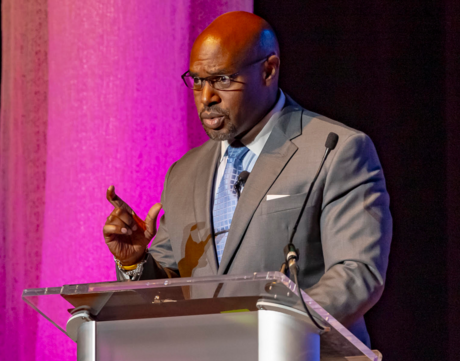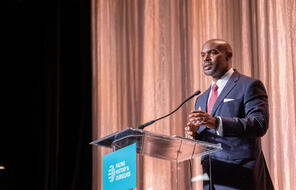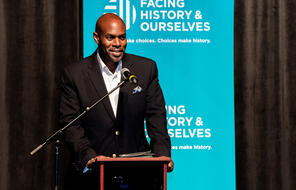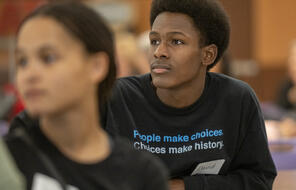
Inclusive Leadership: Lean into Discomfort
As the calendar year comes to a close, I’m looking forward to spending quality time with my family for the holidays. I’m also reflecting on the unique ability of the holiday season to bring loved ones together, even family and friends who don’t always see eye-to-eye. As we gather to celebrate festive occasions, the warmth of the season often transcends ideological debates, fostering an environment where shared memories and traditions take precedence. Dinner table talk and living room chats are often opportunities for open dialogue and understanding, for conversations fueled by the spirit of camaraderie rather than contention. The shared joy of the holiday season tends to create a common ground that encourages tolerance, empathy, and a willingness to appreciate diverse perspectives.
I’ve been thinking quite a bit recently about how education leaders can foster a similar sense of camaraderie within their school communities so that everyone feels valued, supported, and connected to a larger collective vision – even in the midst of polarization. Schools are vibrant, diverse places where students, parents, and staff hold a multitude of values and beliefs informed by their identities and their lived experiences. When our school communities become polarized, the focus shifts from common goals and shared values to entrenched ideological differences. In this way, polarization becomes a weapon of mass distraction.
Leading in a polarized school environment is incredibly challenging. Engaging with people whose values and beliefs contradict our own is uncomfortable and emotional; people are hesitant to do so because of the potential for discomfort and harm. As leaders, it’s part of our job to help our communities navigate polarizing moments by leaning into the discomfort and leading through it.
Back when I was a superintendent, there was a very organized group of parents in my district with a reputation for holding right-wing opinions and values. As a known moderate, left-leaning leader, I was cautioned against meeting with them. Although no previous superintendent had met with them before, I decided that it was important to make space to hear all the voices in my community. I agreed to meet with them regularly throughout the year, where I listened to their concerns and learned that their unifying interest was upholding the US Constitution.
Later that year when student athletes across the district engaged in a series of peaceful protests, this particular parent group was disapproving and advocated for suspensions, expulsions, and other disciplinary action. Again, I was advised not to meet with this group about this issue. I had no intention of suspending the students, so a conversation with this group would be uncomfortable and unproductive, right? I took the meeting anyway. I created space for parents to express their grievances, all the while listening attentively. I also spoke my mind and reminded them of our shared interest in upholding the Constitution. “I hear what you’re asking me to do,” I said, “but I was reading through the Constitution before I came here today, and it seems unconstitutional for me to punish these students for exercising their right to free speech.”
Although the group did not agree with the reason for the student protests, at that moment I was actually able to facilitate consensus that the protests were constitutional and the students should not be punished because I had listened to them enough to understand where we could agree. Making the choice to have a very uncomfortable conversation with an adversarial group actually led to broader support for my decisions as a district leader.
Having uncomfortable conversations like these is necessary, but it is not an easy task. These conversations must be approached with a great deal of preparation and care. Over the years, I’ve found the following actions to be helpful:
- Go boldly into the lion’s den. It will not serve you to shy away from difficult conversations or difficult people. Addressing dissenting voices head-on shows leadership strength and demonstrates your commitment to transparency, accountability, and inclusion.
- Establish a respectful environment. People often enter conversations with impassioned thoughts and beliefs. Emphasize that diverse opinions are valued and that the goal is to understand each other better, even if complete agreement is not reached.
- Set clear objectives. Clearly define the purpose of the conversation. Knowing the intended outcome helps guide the discussion and prevents it from derailing into an unproductive exchange.
- Practice active listening. Actively listen to what others are saying without interrupting. Strive for and demonstrate empathy and understanding with your tone and body language, and ask clarifying questions to ensure that you and others in the room fully understand the perspective being shared.
- Use "I" statements. Express your thoughts and feelings using "I" statements. This fosters an understanding of how individual people are feeling without assigning blame or triggering defensiveness.
- Stay calm and composed. Model emotional intelligence by maintaining composure, even in the face of heated discussions. Keep the conversation focused on the issues at hand rather than allowing it to become unnecessarily broad.
Leading uncomfortable conversations requires a combination of directness, empathy, and active listening. Of these, listening -- careful, intentional listening -- is paramount. I believe that God gave us twice as many ears as our mouths, because he wants us to listen twice as much as we talk. It's an easy concept to understand, but in practice, it's a difficult task to master. When you do master it, though, you will be able to bridge divides within your community and strengthen your position as a trusted leader.









